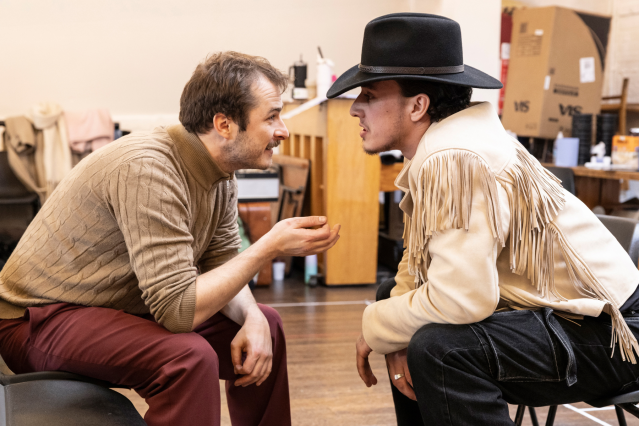Review: The Red Barn (Lyttelton, National Theatre)
Mark Strong leads the cast of David Hare’s adaptation of Georges Simenon’s psychological thriller
Like the playwright David Hare I am a great admirer of the writer Georges Simenon – not only for his Maigret books, but for the deeper, darker novels that he wrote when he left his popular detective behind.
La Main (The Hand) is one of those, written during Simenon’s post-war move to America and in adapting it for the stage Hare has, at the very least, brought a little-known and immensely powerful book to a wider audience.
But he has done something more, fashioning from Simenon’s bleak examination of a man’s soul, a play that recalls the way American writers such as Arthur Miller and Edward Albee fashioned state of the nation plays from the intricacies of family life, while simultaneously retaining its own Hare-like fascination with the lies people tell each other and the society that they create.
There’s a lot going on here, then, but the set-up is admirably stark and simple. In Connecticut in 1969, two couples leave a party in a blizzard; one man gets separated from the others and is lost in the snow. It’s not much on which to build a drama, but the examination of what happens next to all the characters just about sustains a two hour, interval free, running time which uses the tension building devices of a thriller to explore psychological states and emotional dependencies.
The focus is on Donald Dodd (Mark Strong) a small-town lawyer who feels life has passed him by. "It’s as if I have lived my whole life with the handbrake on," he moans. This is a man who seems to fade into the wallpaper, physically flinching when confronted by the sexually potency of the mysterious Mona (Elizabeth Debicki, in a performance almost as enigmatic as the one she gave in The Night Manager) or by the fierce, all-seeing stare of his devoted wife Ingrid (the excellent Hope Davis).
His sense of his own inadequacy is – characteristically for Hare – given a political context. This is the eve of Nixon’s election and the party chatter sets Dodd’s "submissive" belief in the young in context. "I think Nixon could sort this country out," one guest says, making a statement sound like a threat.
As Dodd, Strong is one of the evening’s stars. He is astonishing, finding such detail in his portrayal, becoming a physical incarnation of the man. His long monologue where he explains the revelation he experiences in the Red Barn, where he discovers he wasn’t the man he thought he was, is compelling and profoundly moving.
The other star is Bunny Christie‘s design, which uses sliding screens to reveal and conceal parts of the Lyttelton’s width, unfolding across realistic rooms with surreal filmic grace. With the help of Paule Constable‘s lighting and Tom Gibbons‘ sound design, each change of scene feels like a revelation, which is both beautiful in itself but also emphasises the play’s moral point that people only ever see a small part of the full picture.
Robert Icke directs the entire affair with a stern artfulness, making the dialogue deliberately pointed, the pace pointedly slow as he builds to a genuinely frightening climax. It is a great tribute to Simenon and if something is lost in the switch from the novel’s intense interiority to theatre’s need to explain, something is also gained in the stark shock of the telling.
The Red Barn runs in the Lyttelton, National Theatre until 17 January.












